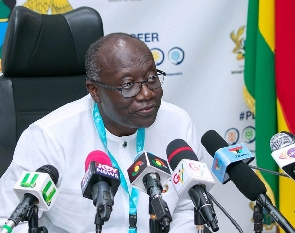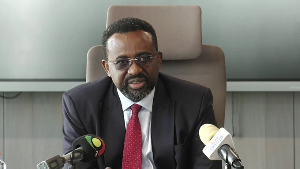Some international investors and corporate managers have expressed confidence in Ghana’s economy and the recovery processes and has thus commended the finance Minister, Mr. Ken Ofori Atta for his efforts in turning the economy around.
Mr Eli Cohen, Minister of Foreign Affairs of the State of Israel upon a visit to Ghana said the country will soon see a brighter and more resilient economy despite its current economic challenges.
He observed that with the right knowledge and investment, the country is on the path of growth and prosperity.
"Believe in the future of Ghana, I believe in the relations between Ghana and Israel, he said at the first edition of the Israel Chana Business Forum.
The forum which was facilitated by the Ghana Investment Promotion Centre (GIPC) under the theme, "Connecting Market Driving Prosperity was aimed at creating avenues for partnerships between Ghanaian and Israeli businesses.
Mr Cohen was accompanied by some eight Israeli companies from areas such as agriculture, water management, clean energy, and cyber security.
A deepened bilateral cooperation between both countries, he said, would help Ghana achieve its vision which included ensuring food security, adding that "I don't think that Ghana should remain an importer of food but rather should be an exporter of food".
"I chose Ghana to be the first country in Africa for my bilateral meetings because I believe in the huge potential for economic relations between Israel and Africa and Ghana in particular.
"I am sure that we will see the fruit of this visit by increasing the level of investment and increasing the capacity of trade volumes between the countries," he said.
Mr Cohen said Israel was willing to share the expertise that has helped the desert country improve its agriculture and produce enough water.
"Today our agriculture is in the desert, and we are able to be competitive," he said.
Meanwhile, World Bank’s latest economic report titled “Price Surge: Unraveling Inflation's Toll on Poverty and Food Security” states that Ghana’s Economic growth is is expected to recover to its potential growth by 2025.
“As a result of efforts to address macroeconomic instability, corrective fiscal and monetary policies are expected to influence total demand and slow down non-extractive GDP growth”, said Pierre Laporte, World Bank Country Director for Ghana, Liberia, and Sierra Leone “High inflation, increased interest rates, and macroeconomic uncertainties will keep private consumption and investment growth below pre-pandemic levels, leading to subdued non-extractive growth in the short term; but growth will begin to recover to its potential by 2025 as drag from fiscal consolidation fades and macroeconomic stabilization and structural reforms start bearing fruit.”, the report noted
Press Releases of Friday, 11 August 2023
Source: Deiu Media Ghana

















